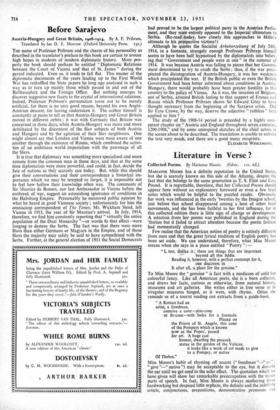Before Sarajevo
THE name of Professor Pribram and the, charm of his personality as described in the translator's preface to this book are certain to arouse high 'hopes in students of modern diplomatic history. More pro- perly -the book should perhaps be entitled " Diplomatic Relations between the Court of Vienna and that of St. James " during the period indicated. Even so, it tends to fall flat. This master of the diplomatic documents of the years leading up to the First World War has reshuffled the State papers he long ago analysed in such a way as to turn up mainly those which passed in and out of the Ballhausplatz and the Foreign Office. But nothing emerges to discover suggestive new facets to the crystal of international relations. Indeed, Professor Pribram's permutation turns out to be merely artificial, for there is no very good reason, beyond his own Anglo- Austrian descent, for having undertaken it. The author himself is constantly at pains to tell us that Austria-Hungary and Great Britain moved in different orbits ; it was with Germany that Britain was concerned in those days, while Austria-Hungary was More and more debilitated by the discontent of the Slav subjects of both Austria and Hungary and by the agitation of their Slav neighbours. One might almost say that London and Vienna were most aware of one another through the existence of Russia, which combined the activi- ties of an ambitious world imperialism with the patronage of all the Slays.
• It is true that diplomacy was something more specialised and more remote from the common man in those days, and that at the same time diplomatists were more powerful, and could, in fact, decide the fate of nations as they scarcely can today. But, while this should give their conversations and their correspondence a historical im- portance which we may be tempted to forget, it is impossible not to feel how hollow their knowledge- often was. The comments- of Sir Maurice de Bunsen, our last Ambassador in Vienna before the outbreak of war, suggest an astonishing ignorance of conditions in the Habsburg Empire. Presumably he measured public opinion by what he heard in good Viennese society ; unfortunately for him the omniscient correspondent of The Times, Mr. Wickham Steed, left Vienna in 1913, the year of Sir Maurice's arrival. In July, 1914, therefore, we find him constantly reporting that " virtually the entire population of the Dual Monarchy "—or words fo that effect—were longing to destroy the Serbs. The 'fact was that there were more Slays than either Germans or Magyars in the Empire, and of those Slays the majority may safely be said to have sympathised with-the Serbs. Further, at the general election of 1911 the Social Democrats had proved to be-the largest political party in the Austrian Parlia- ment, and they were entirely opposed to the Imperial ultimatum to Serbia. (Re-read itoday, how closely this approaches to Hitler's ultimata to his prospective victims!) Although he quotes the Socialist Arbeiterzeitung of July 24th, 1914, in a footnote, strangely enough Professor Pribram himself seems to have been half hypnotised by the diplomatists into -believ- ing that " Government and people were at one " in the summer of 1914. It was because Austria was falling to pieces that her Govern- ment determined to try to crush the Serbs ; thus, if the war preci- pitated the disintegration of Austria-Hungary, it was her weakness which precipitated the war. If the British public or even the British Government had been better informed about conditions in Austria- Hungary, there would probably have been greater hostility in this country to the policy of. Vienna. As it was, the invasion of Belgium, not of Serbia, aroused British feeling to that support of France and Russia which PrOfessor Pribram shows Sir Edward Grey to have thought necessary from the beginning of the Sarajevo crisis. Did Sir Eyre Crowe, by the way, deserve the adjective " ruthless " here applied to him ?
The study of the 1908-14 period is preceded by a highly com- petent chapter on "Austria and England throughout seven, centuries, 1200-1908," and by some uninspired sketches of the chief actors in the scenes about to be described. The translation is unable to enliven the text very much, and there are a good many. misprints.
ELIZABETH WISKEMANN.


































 Previous page
Previous page